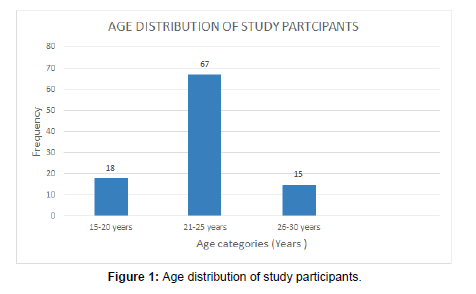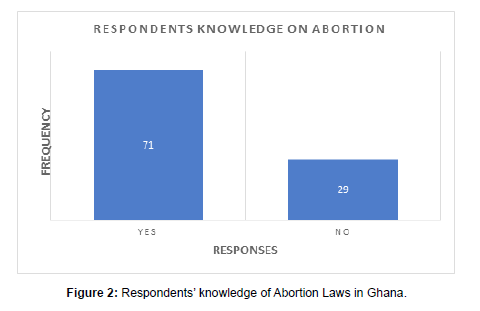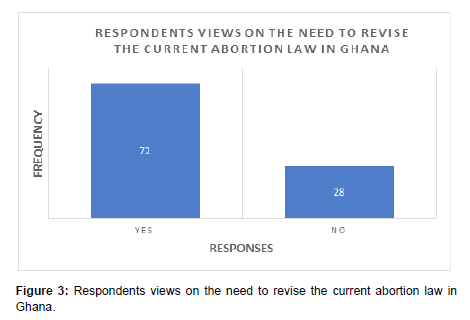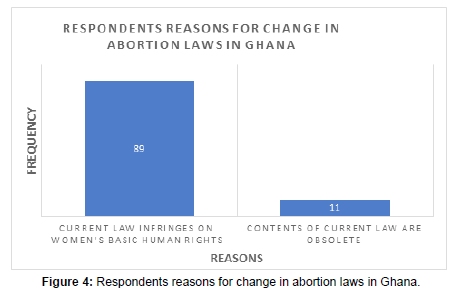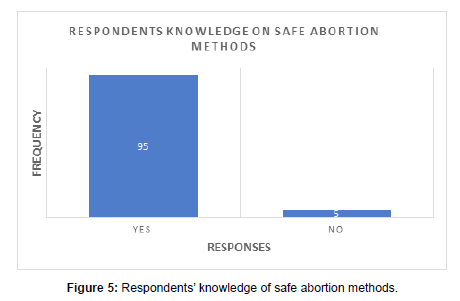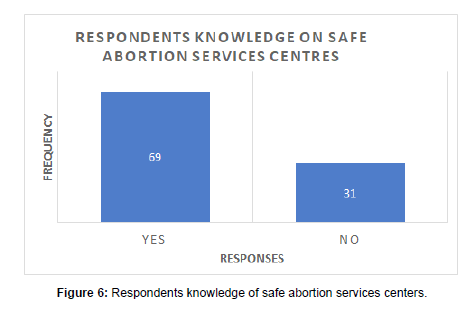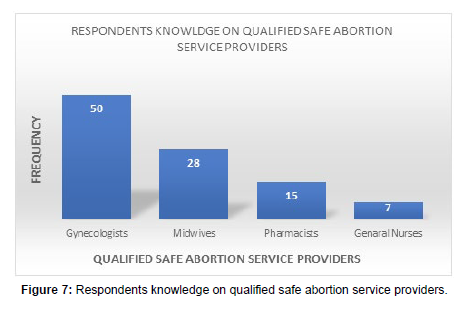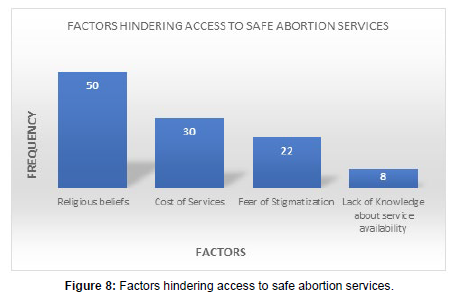Knowledge of Ghanaian Abortion Laws and Factors Hindering the Access to Safe Abortion Services by Female Students at the Tamale Campus of the University for Development Studies (U.D.S)
Received: 01-May-2023 / Manuscript No. Jpch -23-97269 / Editor assigned: 03-May-2023 / PreQC No. Jpch -23-97269 (PQ) / Reviewed: 17-May-2023 / QC No. Jpch -23-97269 / Revised: 19-May-2023 / Manuscript No. Jpch-23-97269(R) / Accepted Date: 26-May-2023 / Published Date: 26-May-2023
Abstract
Young women in the universities have an independence streak and have no restraints from parents, or school authorities regarding their sex lives, and are at liberty to experiment and have as much sex as desired, sometimes if they are not careful and probably have little knowledge on how to prevent unwanted pregnancies, they can pick seed and conceive. Lack of support from partners and/or family and limited monetary support can lead them to make wrong choices regarding the termination of an unwanted pregnancy. The aim of this study was to assess the knowledge and factors hindering access to safe abortion services among female students at the Tamale campus of the U.D.S. This was a descriptive cross-sectional study conducted at the Tamale campus of the U.D.S. 100 female students between the ages of 15 and 45 years were conveniently selected from a database of 187 female students. A questionnaire containing the relevant research questions related to the topic was designed using google forms, pre-tested on randomly selected 20 participants out of the total study population and subsequently self-administered to 100 female students through a web-based electronic platform. Data were analyzed using SPSS version 20.0. Age distribution of study participants: 15-20 Years, 18 (18%), 21-25 Years, 67(67%), 26-30 years, 15(15%). Knowledge of abortion laws in Ghana: 71(71%) Yes, 29(29%) No. Revision of the current abortion law in Ghana: 72(72%) Yes, 28(28%) No. Reasons for change in abortion Laws: Infringes on basic human rights of women 89(89%), Contents are obsolete 11(11%). Knowledge of safe abortion methods: 95(95%) Yes, 5(5%) No. Knowledge of safe abortion centers: 69(69%) Yes, 31(31%) No. Knowledge of qualified safe abortion service providers: Gynecologists 50(50%), Midwives 28(28%), Pharmacists 15(15%), General Nurses 7(7%). Factors hindering access to safe abortion services: Religious beliefs 50(50%), Cost of services 30(30%), Fear of stigmatization 22(22%), Lack of knowledge about services 8(8%). Most of the student participants were between the ages of 21 and 25 years. The majority of the students have knowledge about abortion laws in Ghana, the different methods of safe abortion, and the availability of safe abortion service centers and providers. Half of the students are of the view that religious beliefs generally interfere with their willingness and readiness to access safe abortion services and that the Gynecologist is usually the most qualified medical specialist to provide safe abortion services.
Keywords
Knowledge; Factors hindering access; Safe abortion; Female students
Introduction
Abortion can be defined as the expulsion or removal of a fetus or embryo from the uterus thus, carrying out its death usually before the period of viability and it can be spontaneous or induced [1]. It can be safe or unsafe depending on where it is done, who performs the procedure or the quality of instruments used and is widely undertaken by women of all religious, cultural or socioeconomic backgrounds as well as by women of various reproductive ages [2]. Women who have never been married and have no children have terminated a pregnancy before and are less likely to undergo a safe abortion as they are likely to be of a low socioeconomic status [3]. Abortions are considered safe when performed with a method that is recommended by the Word Health Organization (W.H.O) before the period of viability by a skilled person. These abortions can be done by administering simple tablets (Medical abortion) or a simple outpatient procedure [4]. An important obstacle to the acquisition of safe abortion care and services is the lack of adequately trained personnel (Kim et al, 2020). However, the attitudes of trained health personnel available as well as their beliefs can affect the provision of these safe abortion care services even in establishments where they can be provided [5]. Furthermore, the unhospitable demeanors of health personnel toward young women especially those who are single and choosing to have a safe abortion is very appalling and act as a major hindrance [6]. Knowing your rights and being aware of the status of laws in your country can significantly impact the health seeking behavior of a woman when it comes to accessing and making use of the available services [7]. Health care providers in many sub-Saharan African and South East Asian countries where elective abortions are legal on various grounds often view that kind of abortion as immoral, instead of accepting the legal status of abortion in their country [8]. Currently in Ghana, abortion is a criminal offense regulated by Act 29, section 58 of the criminal code of 1960, amended by PNDCL 102 of 1985 [9]. Young women in universities have an independent streak and have no restraints from parents or school authorities regarding sex lives and are at liberty to experiment and have as much sex as desired, sometimes if they are not careful and probably have little knowledge on how to prevent unwanted pregnancies, they can pick seed and conceive [10]. It is especially important to know what view university students have on unintended pregnancies that require termination, how they deal with them and their options and opinions in resolving these issues as well as their knowledge and perception about the abortion law and services available [11]. Lack of support from partners and/or family and limited monetary support can lead university female students to make wrong choices regarding the termination of an unwanted pregnancy [12]. The aim of this study was to assess the knowledge and factors hindering the access to safe abortion services among female students at the Tamale campus of the U.D.S.
Materials and Methods This was a descriptive cross-sectional study conducted at the Tamale campus of the U.D.S. The sample size of hundred (100) participants was calculated using Cochran’s formula N=Z2(pq)/E2 (Where N is the sample size; Z is the coefficient of significance (1.96) for significance level (α) of 5% (0.05); p is proportion of females in the reproductive age group with knowledge about the abortion services and the abortion law determined by Adera at 71.6% (0.716) [13]. q is (1-p) and E represents the allowable error margin fixed at 10%. A database containing email addresses and telephone contacts of all female students (187) between the ages of 15 and 40 years admitted into the different programs of study within the Tamale Campus of the U.D.S was obtained from the Registrar in charge of admissions. All the 187 potential study participants were contacted by the lead researcher both via email and telephone asking that to visit the research office at their earliest opportunity for very important information. The first 100 students to visit the office were selected as the final study participants. A Questionnaire containing the relevant research questions related to the topic was designed using google forms, and electronically pretested on twenty (20) of the selected final study respondents who were randomly selected using a YES or NO balloting system. Inputs and suggestions derived from the pilot study were incorporated into the final version of the questionnaire which was subsequently administered to the entire study population through a web-based platform [14]. Data were analyzed using SPSS version 20.0. Only female university students between the reproductive ages of 15 and 40 years were included in the study. Female students who met the inclusion criteria but refused to consent as well as those who did not meet the inclusion criteria were all excluded from the study. Participation in the study was voluntary and participants were made to understand that research was purely for academic purposes and their confidentiality would be strictly guaranteed. Study participants were also provided with substantial information about the study to enable them to make an informed decision and provide valid responses.
Results
Age distribution of study participants: 15 – 20 years, 18 (18%), 21 – 25 years, 67(67%), 26 – 30 years, 15(15%). (Figure1).
Respondents’ knowledge on Abortion Laws in Ghana: 71(71%) Yes, 29(29%) (Figure 2).Respondents’ views on the need to revise the current abortion law in Ghana: 72(72%) Yes, 28(28%) (Figure 3).
Respondents’ reasons for change in abortion laws in Ghana: Current law infringes on women’s basic human rights 89(89%), Contents of current law are obsolete 11(11%) (Figure 4).
Respondents’ knowledge on safe abortion methods: 95(95%) Yes, 5(5%) [Figure 5).
Respondents’ knowledge of safe abortion services centers: 69(69%) Yes, 31(31%) (Figure 6).
Respondents’ knowledge on qualified safe abortion service providers: Gynecologists 50(50%), Midwives 28(28%), Pharmacists 15(15%), General Nurses 7(7%) (Figure7).
Factors hindering the access to safe abortion services: Religious beliefs 50(50%), Cost of services 30(30%), Fear of stigmatization 22(22%), Lack of knowledge about service availability 8(8%) (Figure 8).
Discussion
Most of the study participants are between the ages of 21 and 25 years (Figure 1). This finding is not surprising since that is generally the age category for which Ghanaian students are admitted for tertiary education. The majority of the respondents were knowledgeable about the existence of an abortion law in Ghana (Figure 2). However, this finding is higher than the results obtained by Adhikari et al, 2016 from their study in Nepal where only 40% of study participants even knew about the existence of an abortion Law in Nepal. This difference in depth of knowledge about abortion Laws seems to be obvious since at least educational backgrounds of the two study populations are not the same (University female students 15 - 40 years versus female youth 15 – 25 years old in a database obtained from the general population of females. Similarly, the vast majority of study participants are of the view that the current contents of the abortion law in Ghana must be revised (Figure 3). And possibly changed because its contents greatly infringe on the basic human rights of women (Figure 4). These results are reflective of the urgent need for the Ghana government to start making preparatory steps towards the possibility of reviewing and changing the current abortion law in the country. Although an overwhelming majority of respondents were knowledgeable about the existence of safe abortion methods (Figure 5). A substantive number of them did not know about the availability of safe abortion services centers (Figure 6). This finding is consistent with the results from a study conducted in South Ethiopia by Mekuriaw et al, 2015 who reported that only 38.5% of respondents had knowledge about the existence and access to safe abortion practices and services. Half of the respondents identified the gynecologist as the most qualified health care professional to perform or provide safe abortion (Figure 7). This result is not surprising since it is a common knowledge within the human society that gynecologists by virtue of their training and expertise are considered the most highly qualified health care professionals to provide safe abortion practices and services. On the other hand, about half of the study participants consider religious beliefs are the most significant factor that hinders the access to safe abortion practices and services followed by cost of providing these services (Figure 8). These results are in agreement with findings from a study executed by Atakro et al, 2016 in the Ashanti Region of Ghana. Furthermore, Loi et al, 2015 in their study also reported that healthcare professionals in many Sub-Sharan Africa and South East Asia where elective abortions are legal based on various grounds often view that kind of abortion as immoral, instead of accepting the legal status of abortion in their countries.
Study limitations
Due to the nature of our study design and methodology, we could not establish an objective relationship between the factors affecting the access to safe abortion services and the respondents’ perceptions about the concept of abortion in general.
Conclusions
Most of the study participants are between the ages of 21 and 25 years. The majority of the students have knowledge about abortion laws in Ghana, the different methods of safe abortion, and the availability of safe abortion service centers and providers. Half of the students are of the view that religious beliefs generally interfere with their willingness and readiness to access safe abortion services and that the Gynecologist is usually the most qualified medical specialist to provide safe abortion services.
Recommendations
1. Ghana Education Services (GES) together with the Public Health Department of the Ghana Health Services (GHS) should intensify their efforts on public education and awareness of the abortion laws with a more emphasis on female university students
2. Again, the GES and the GHS should collaborate to incorporate special sessions on the abortion laws of Ghana as part of the academic curriculum of public universities in Ghana
3. The GES and the GHS should create a partnership with leadership from the various religious institutions in Ghana to conduct landmark research that will determine the true impact of religious beliefs on university students’ perception concerning abortion in general
4. Further studies are required by the Ghanaian scientific community to determine the actual prevalence of safe abortion practices among the university student population in Ghana Conflict of Interest
All the researchers have no conflict-of-interest situations to declare Sources of Funding
This research did not receive any specific grant from any funding agencies in the public, commercial or not-for profit sectors
Authors Contributions
MMDM conceived the research idea and wrote the manuscript. NRB and RNF conducted the literature review and collated all the relevant data. PPB and CA performed the data processing and analysis. All authors thoroughly reviewed the manuscript and approved its content for publication
Acknowledgement
The authors wish to officially acknowledge Mr. Isaac Mensah for his valuable contributions and guidance during the data processing and analysis
Data availability statement
All the quantitative and qualitative data used in writing the article are included in this manuscript
References
- Adeleke NA, Farinloye EO, Adebimpe WO (2015) patterns Of Reproductive Health And Sexual Behaviours Among Female Undergraduates In Osun State South West Nigeria. Sierra Leone j biomed Res 7: 20-27.
- Adhikari R (2016) Knowledge on legislation of abortion and experience of abortion among female youth in Nepal: A cross sectional study. Reprod Health 13: 1.
- Aniteye P, O’Brien B, Mayhew SH (2016)Stigmatized by association: challenges for abortion service providers in Ghana. BMC Health Serv Res 16: 1.
- Assifi AR, Berger B, Tunçalp Ö, Khosla R, Ganatra B, et al. (2016) Women’s Awareness and Knowledge of Abortion Laws: A Systematic Review. PLOS ONE 11: 0152224.
- Atakro CA, Addo SB, Aboagye JS, Menlah A, Garti I, et al. (2019) Contributing factors to unsafe abortion practices among women of reproductive age at selected district hospitals in the Ashanti region of Ghana. BMC Women’s Health 19: 1.
- Engelbert Bain L, Amoakoh Coleman M, Tiendrebeogo KST, Zweekhorst MBM, de Cock Buning, et al. (2020) Attitudes towards abortion and decision-making capacity of pregnant adolescents: perspectives of medicine, midwifery and law students in Accra, Ghana. Eur J Contracept Reprod Health Care 25:151-158.
- Harris LH (2013) Abortion politics and the production of knowledge. Contraception 88 (2) : 200-203.
- Kheswa JG (2014) Exploring the impact of abortion on female students at a South African University campus: A Phenomenological Study. Acad J Interdiscip Stud 3: 111-120
- Kim C, Sorhaindo A, Ganatra B (2019) WHO guidelines and the role of the physician in task sharing in safe abortion care. Best Pract Res Clin Obstet Gynaecol.
- Mekuriaw S, Adissalem Dereje RM (2015) Knowledge, Attitude and Practice towards Safe Abortion among Female Students of Mizan-Tepi University, South West Ethiopia. J Womens Health Care 04: 06.
- Olaitan OL (2011) Attitudes of University Students Towards Abortion in Nigeria. Int J Trop Med 6: 3 52-57.
- Rehnström Loi U, Gemzell Danielsson K, Faxelid E, Klingberg Allvin M (2015) Health care providers’ perceptions of and attitudes towards induced abortions in sub-Saharan Africa and Southeast Asia: a systematic literature review of qualitative and quantitative data. BMC Public Health 15: 1.
- Sundaram A, Juarez F, Bankole A Singh (2012) Factors Associated with Abortion-Seeking and Obtaining a Safe Abortion in Ghana. Studies in Family Planning 43: 273-286.
- Technical Working Group on the Prevention and Management of Unsafe Abortion (1992: Geneva, S. and Programme, W.H.O.M.H. and S.M. (1993). The Prevention and management of unsafe abortion: report of a technical working group, Geneva, 12-15 April 1992.
Indexed at, Crossref, Google Scholar
Indexed at, Crossref, Google Scholar
Indexed at, Crossref, Google Scholar
Indexed at, Crossref, Google Scholar
Indexed at, Crossref, Google Scholar
Indexed at, Crossref, Google Scholar
Indexed at, Crossref, Google Scholar
Indexed at, Crossref, Google Scholar
Indexed at, Crossref, Google Scholar
Indexed at, Crossref, Google Scholar
Citation: Mark H (2023) Knowledge of Ghanaian Abortion Laws and Factors Hindering the Access to Safe Abortion Services by Female Students at the Tamale Campus of the University for Development Studies (U.D.S). J Preg Child Health 10: 590.
Copyright: © 2023 Mark H. This is an open-access article distributed under the terms of the Creative Commons Attribution License, which permits unrestricted use, distribution, and reproduction in any medium, provided the original author and source are credited.
Select your language of interest to view the total content in your interested language
Share This Article
Recommended Journals
Open Access Journals
Article Usage
- Total views: 2809
- [From(publication date): 0-2023 - Dec 22, 2025]
- Breakdown by view type
- HTML page views: 2460
- PDF downloads: 349

